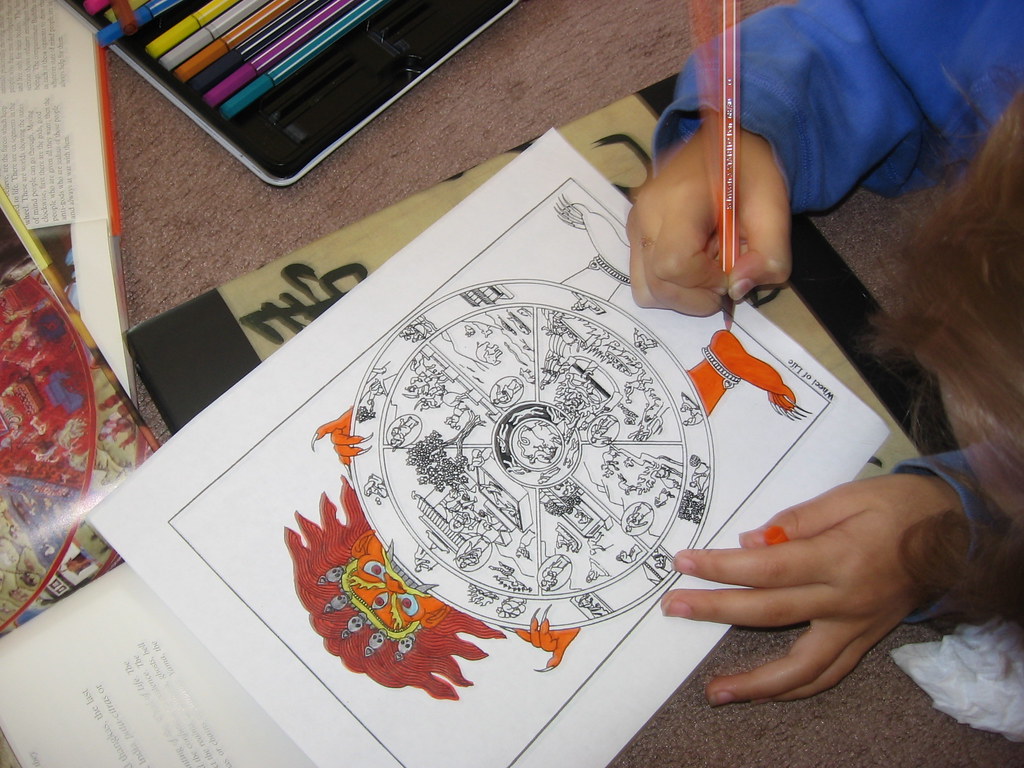For this first lesson, I just wanted to introduce the idea of the Six Realms and the Wheel of Life, and allow as much or as little time available to examine the image and let the girls see what they would see. [That link to the Wheel of Life depicts the Animal Realm below the Human Realm. Some Buddhist sects view it this way. In our Zen sect we find the Hungry Ghost realm in that spot.] There is a book in the Zen Center library that is at about 4 feet tall with giant photos of Buddhist art. We spent time examining the image of Yama holding the Wheel of Life, and I and my co-teacher Kim would say just a little bit about the images that attracted the girls. They didn't think the Animal Realm looked like that bad of a place, and they noticed that the Heaven and Hell realms seemed like opposites, but wondered about the Animal and Human realms or the Hungry Ghost and the Asura (Jealous Gods) realms being opposites. That sparked a conversation about the realms not necessarily being opposites, but ways of being that we can find ourselves in, and the idea is not to get stuck in any of them, even the Heaven realm.
They also noticed the circle that depicts the twelve links of dependent origination. Trust kids to find the man and woman having sex, depicting karmic existence or rebirth. I readily admitted the twelve links of dependent origination are complex and adults can have a difficult time understanding them. I wish I'd recorded the lesson, because Kim told me what I said sounded pretty good, but as soon as it left my mouth, I couldn't remember what I'd said, exactly. I told them as far as I understood it, the Six Realms show us different states of being that we experience, and dependent origination explains how that being comes into existence, how we get wrapped up in our greed, anger, or delusion so that we become a being in one of those realms. Or something like that.
The girls were rather interested in Yama, the Lord of the Underworld holding up this mirror, showing us our worldly existence, so while they colored, I decided to wing it and tell them a story that comes out of India.

I found this story in Shower of Gold: Girls and Women in the Stories of India retold by Uma Krishnaswami. Uma's version of Savriti and the God of Death was a bit different than Deepak Chopra's version found here.
As I told the story, I welcomed comments and questions, and the girls colored as they listened and commented. I retell it here, perhaps not exactly as I did that day.
Savriti and the God of Death
Once there was a king and queen who were old and never had children, even though they wanted a child. One day they were finally blessed with a girl, and she grew up to be the best at everything. Savriti was beautiful, smart, and athletic. At that time and place, people usually preferred to have sons, but the king and queen were so happy with their talented daughter, they did not miss having a boy. When she grew up, it was hard to find a husband though. Men weren't interested in a princess who was wiser, more educated, and more clever than they were. Savriti went out to explore and to find a worthy husband.
Savriti returned home rather quickly. She found her love in a forest, son of a blind king and queen whose lands were stolen from them. She didn't care that he was poor. He was kind and wise. Even though she was warned by a fortune-teller that this man would die in exactly one year, she didn't care. She chose the happiness she could have with him now, in the forest. The fortune-teller gave her a mantra to practice, one that could give her the power to see what others could not. She was to recite this mantra for the three days and nights before her husband's death.
The year passed, and as the fateful day grew closer, Savriti became more thoughtful. She prayed and fasted and chanted the mantra for three days. Her husband fell from a tree and died. When Yama, Lord of the Underworld, came to take him away, Savriti could see him, unlike other living people. It was through her meditative practice of chanting the mantra that she could see the cycle of life and death, and the one who holds the mirror of the wheel of life. She was so clever, she ran after them and negotiated with Yama. Yama was so impressed with her love and compassion, he granted her anything she asked, but her husband's life. She gained wealth for her in-laws, and health and youth for them and her parents. Still she would not relent, and finally she got Yama to agree to her husband's life as well. They lived long and their kingdoms united with peace and prosperity.